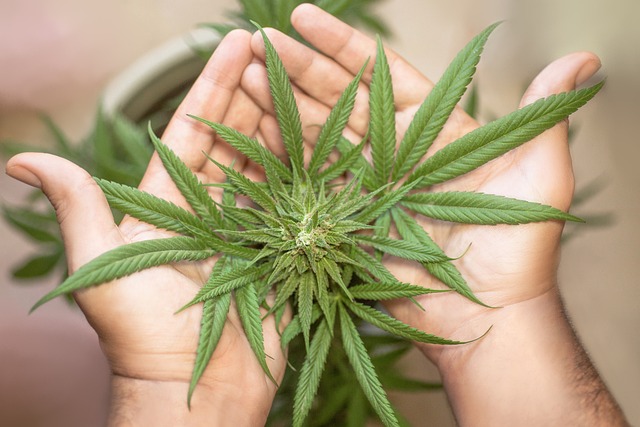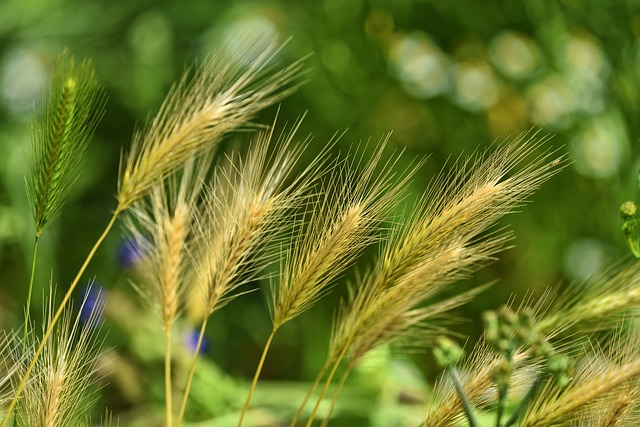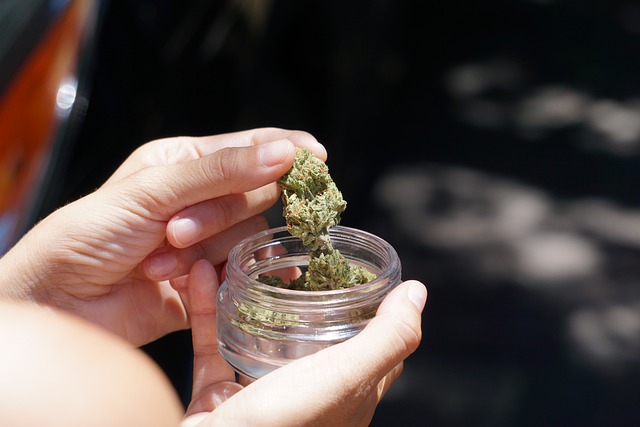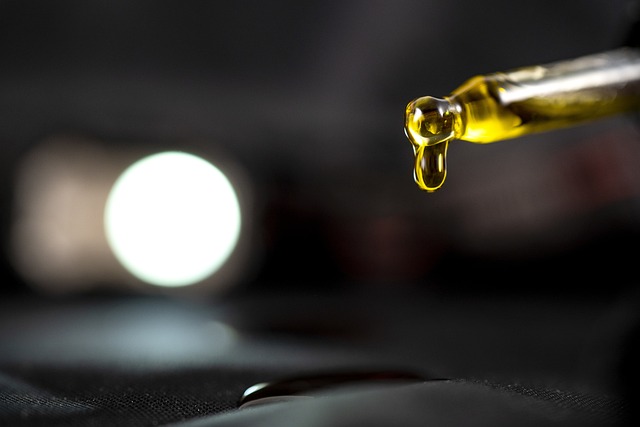The state of Kansas has recently legalized THCA-rich flowers, a form of cannabis that contains less than 0.3% delta-9-tetrahydrocannabinol (THC), under its new legislative stance. This move reflects the recognition of THCA's potential therapeutic benefits, which may provide relief from various medical conditions without the psychoactive effects associated with THC after it is activated through heat. As Kansas explores alternative treatments within a regulatory framework that adapts to scientific advancements, users and healthcare providers are examining the advantages of THCA flower. This change emphasizes the state's commitment to providing medical solutions while carefully considering cannabis legislation. It's important for consumers to stay informed about the legal status of THCA in Kansas, as well as to be aware of its potential side effects, which include mild psychoactive effects upon heating, dry mouth, red eyes, and mood alterations, along with other less common side effects like dizziness or anxiety. Users are advised to consult with healthcare professionals, especially those with pre-existing health conditions or who are on other medications that may interact with THCA. The legal use of THCA in Kansas requires adherence to strict regulations to ensure safe and responsible consumption.
THCA, or tetrahydrocannabinolic acid, is a naturally occurring compound within the cannabis plant that has garnered attention for its potential therapeutic properties. As THCA flower gains traction in Kansas, where its legal status is clarified, it’s crucial to understand both its benefits and side effects. This article delves into the multifaceted impact of THCA flower on users, from its legal standing in Kansas to a detailed examination of its side effects. We explore the psychological and physical responses associated with its consumption, navigate dosage recommendations, and emphasize safety considerations for optimal use. Join us as we dissect the science behind THCA flower and provide valuable insights for those intrigued by this emerging wellness option.
- Understanding THCA Flower: Legal Status and Potential Benefits in Kansas
- THCA Flower Side Effects: A Comprehensive Overview
- Psychological Impacts of THCA Flower Consumption: Mood and Cognitive Changes
- Physical Responses to THCA Flower: From Pain Relief to Potential Adverse Reactions
- Navigating Dosage and Safety: Best Practices for THCA Flower Use in Kansas
Understanding THCA Flower: Legal Status and Potential Benefits in Kansas

In Kansas, the legal landscape regarding cannabis and its derivatives has undergone significant changes, particularly with the emergence of THCA flower. Tetrahydrocannabinolic acid (THCA) is the raw form of THC found in cannabis plants before it is heated or decarboxylated, which typically activates its psychoactive properties. As of recent updates to Kansas law, THCA-rich flowers containing less than 0.3% delta-9-tetrahydrocannabinol (THC) have been legalized for medical use. This legislative shift has opened up new avenues for patients seeking relief from various ailments, as preliminary research suggests that THCA may offer potential therapeutic benefits without the psychoactive effects associated with THC once it is activated. The interest in THCA flower in Kansas stems from its non-intoxicating nature and the belief that it could provide relief for conditions like chronic pain, inflammation, and nausea, among others. Patients and healthcare providers in Kansas are now exploring these potential benefits within the confines of the state’s regulatory framework, which continues to evolve alongside the growing body of research on cannabinoids. As such, those interested in THCA flower should stay informed about the latest developments in state law and consult with medical professionals to understand how it might complement their healthcare regimen. The legal status of THCA flower in Kansas is a testament to the state’s commitment to exploring alternative treatment options while navigating the complexities of cannabis legislation.
THCA Flower Side Effects: A Comprehensive Overview

delta-9-tetrahydrocannabinolic acid (THCA) flower, the raw form of cannabis that contains THC in its non-psychoactive acidic form, has garnered attention for both its therapeutic potential and its side effects. As legal landscapes evolve, such as THCA being legal in Kansas under certain conditions, consumers are increasingly exploring its benefits and risks. While THCA is not psychoactive like delta-9-THC, it interacts with the body’s endocannabinoid system and has been studied for its anti-inflammatory, neuroprotective, and potential anti-cancer properties. However, like all cannabinoids, THCA flower can elicit side effects in some individuals. Common reported side effects include mild psychoactive effects when heated or decarboxylated, dry mouth, red eyes, and altered mood. Additionally, some users may experience dizziness, lethargy, or anxiety when consuming THCA flower, particularly at high doses. It’s important for consumers to approach THCA flower with caution, adhering to the legal parameters set forth by state laws like those in Kansas, and starting with low doses to gauge individual sensitivity. Users should also be aware of potential drug interactions, as THCA can affect how other drugs are metabolized. Consultation with a healthcare provider is recommended before incorporating THCA flower into one’s wellness routine, especially for individuals with pre-existing health conditions or those taking medications that could interact with cannabinoids.
Psychological Impacts of THCA Flower Consumption: Mood and Cognitive Changes

Consumption of THCA flower, the non-psychoactive precursor to delta-9-tetrahydrocannabinol (THC), has been a subject of growing interest due to its potential therapeutic properties. In states where THCA is legal, including Kansas, individuals have explored its effects for various health conditions and wellness purposes. One aspect of its influence that warrants attention is its impact on psychological well-being, particularly regarding mood and cognitive function. Users may report elevated mood or feelings of euphoria following THCA flower consumption, which can be attributed to its affinity for the body’s endocannabinoid system. This system plays a crucial role in regulating emotions and mental processes. However, it is imperative to note that individual responses to THCA can vary significantly based on dosage, method of intake, and personal physiology. Some individuals may experience increased clarity of thought or enhanced focus, while others might notice subtle shifts in perception or a heightened sense of creativity. It is essential for users to approach the consumption of THCA flower with caution, particularly if they have underlying psychological conditions or are taking other medications, as interactions can alter the intended effects and potentially lead to adverse outcomes. Users should also be aware that while THCA is legal in Kansas, its legality may differ in other regions, and it is subject to strict regulations regarding possession, sale, and use. As such, potential consumers should thoroughly research local laws and consult with healthcare professionals before incorporating THCA flower into their wellness routines.
Physical Responses to THCA Flower: From Pain Relief to Potential Adverse Reactions

THCA, or tetrahydrocannabinolic acid, is a non-psychoactive cannabinoid found in the cannabis plant that is often converted into THC through heat during the smoking or vaporizing process. As such, it holds potential therapeutic benefits without the immediate psychoactive effects associated with THC. In states where cannabis has been legalized, including Kansas for certain THCA-containing products, individuals have explored its use for various reasons. Physically, THCA interacts with the body’s endocannabinoid system, which plays a role in regulating pain, inflammation, and other physiological processes. Users report experiencing pain relief, which is particularly beneficial for those suffering from chronic pain conditions. Additionally, some preliminary studies suggest that THCA may have neuroprotective properties and could be useful in treating nausea and stimulating appetite.
However, like any substance, THCA flower can elicit side effects or adverse reactions, especially when consumed in large quantities or by individuals sensitive to cannabinoids. Common physical responses include dry mouth and red eyes, which are typically mild and short-lived. There have been rare instances of more serious side effects such as anxiety, paranoia, and acute psychotic episodes, particularly among those with a predisposition to such reactions. It is important for consumers to be aware that while THCA flower may offer therapeutic benefits, it is not without potential risks. Users should start with small doses to gauge their individual response and consult with healthcare professionals if they have concerns about interactions with other medications or conditions. As legal landscapes evolve, such as the status of THCA in Kansas, it is crucial for consumers to stay informed about the latest research and regulations regarding cannabis products.
Navigating Dosage and Safety: Best Practices for THCA Flower Use in Kansas

Navigating the appropriate dosage and ensuring safety when using THCA flower in Kansas requires a cautious and informed approach. As THCA is considered legal in Kansas under state law, it’s crucial for users to understand its effects and how it differs from other cannabinoids like THC. The Hemp Farming Act of 2018 federally legalized hemp and its derivatives, including THCA, as long as they contain less than 0.3% delta-9-THC. However, state laws can be more stringent, so it’s imperative to stay updated on local regulations.
When determining dosage, it’s advisable to start low and go slow. This means beginning with a small amount of THCA flower and observing its effects before considering an increase. Individual sensitivity to cannabinoids varies greatly, and what may be a mild experience for one person could be overwhelming for another. Safety precautions include using high-quality, lab-tested products to avoid potential contaminants or incorrect cannabinoid concentrations. Additionally, users should be aware of how THCA might interact with other medications they are taking. Consulting with a healthcare provider is always recommended, especially for those with pre-existing health conditions or those who may be particularly sensitive to the effects of cannabinoids. Understanding the nuances of THCA’s legal status and responsible usage ensures that individuals in Kansas can enjoy the potential benefits of this compound while prioritizing their well-being.
In concluding our discussion on THCA flower, it’s clear that while this cannabinoid holds potential benefits and has a clear legal status in Kansas, its side effects must be carefully considered. Users should approach THCA flower with an understanding of both its psychological and physical impacts, including mood and cognitive changes as well as pain relief and adverse reactions. Navigating the right dosage and prioritizing safety are crucial for optimizing the experiences and benefits of THCA flower in Kansas. Prospective consumers should consult with healthcare professionals to make informed decisions about incorporating THCA flower into their wellness routines, ensuring they fully understand its effects within the legal framework established by state laws.
